How’s Business – A Berlin Special
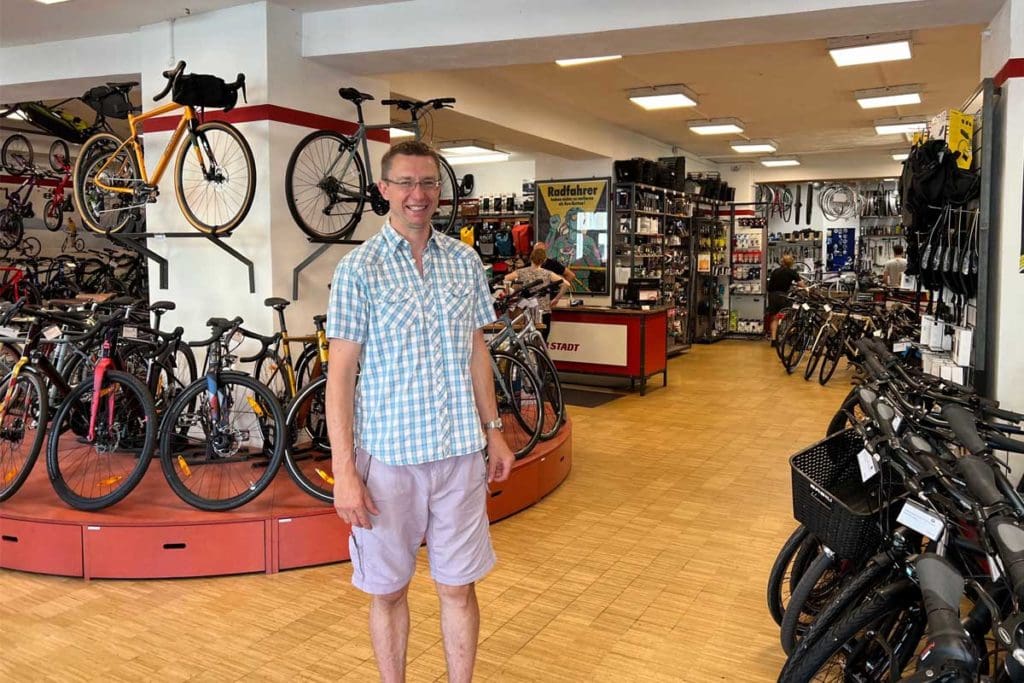
Berlin, Germany
Germany continues to be the biggest market for bicycles in the European Union and e-bikes are steadily growing towards claiming 50% of its total unit sales. However, it doesn’t take much searching in the nation’s capital, Berlin, to find examples that buck the trend completely.
While major city commuting and e-bikes appear to be intertwined at the heart of a modern cycling revolution, one store in the heart of Berlin is finding a much stronger adherence to the 100% human-power analogue varieties.
E-Bike sales represent only around 1% of trade for the Rad der Stadt store (which translates to Wheel of the City) and owner Jork Klingenberg doesn’t see that increasing much within the tight confines of their neighbourhood around Prenzlauer Allee.
“E-bikes are not so popular in downtown because we have the problem of storing them,” Jork said.
He said old-city architecture, including a predominance of high-density accommodation, mean it’s not practical to take e-bikes into most homes and, because of their higher value compared to analogue bikes, owners don’t want to leave them out in the street.
Even the possibility of publicly provided secure on-street storage was problematic because of limited space in narrow residential streets and arterial roads already filled with car lanes, bike lanes, footpaths and tramlines.
“The distances people need to cycle in the inner city are not far, so it is less beneficial to have a motor,” he added.
“And once they reach their destination, the stores and cafes are also very small, so you cannot take your bike in off the street.
“We have e-bikes for sale but we only sell about five of them a year.”
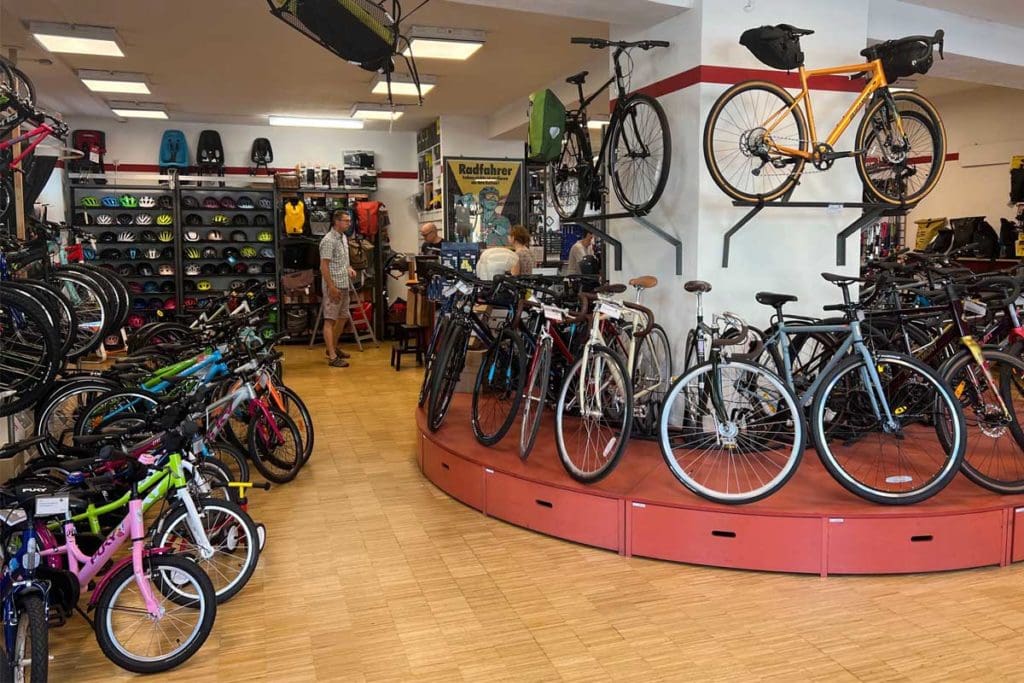
Rad der Stadt is highly familiar with the urban bike market. Berlin’s population has one of Europe’s highest proportions of families with children and many of them are centred close to Prenzlauer Allee. So it’s not surprising around 70% of Rad der Stadt’s trade is commuter bikes – and children’s bikes are another large slice of their business.
The store’s floorspace is dominated by city commuter bikes in all their permeations – from funky, sporty and elegant to the ultra-practical – and most of them are Bergamonts, Scott’s Munich-based urban bike division.
Jork said the store was receiving an increasing number of enquiries about cargo bikes. However, like their general trend, those enquiries are predominantly for non-electric versions.
“We haven’t been doing a lot of sales of cargo bikes because we don’t have the space,” he said.
“We’re getting more enquiries about cargo bikes than e-bikes, so we’re thinking next year we will introduce them more.”
Rad der Stadt was established in 2008 by three colleagues who previously worked in different bike stores. It enjoyed steady business growth until 2016, plateaued until the global pandemic boom in 2020 and 2021, and this year has returned to its pre-Covid sales level of 2019.
“Our family bike sales remain strong,” Jork said.
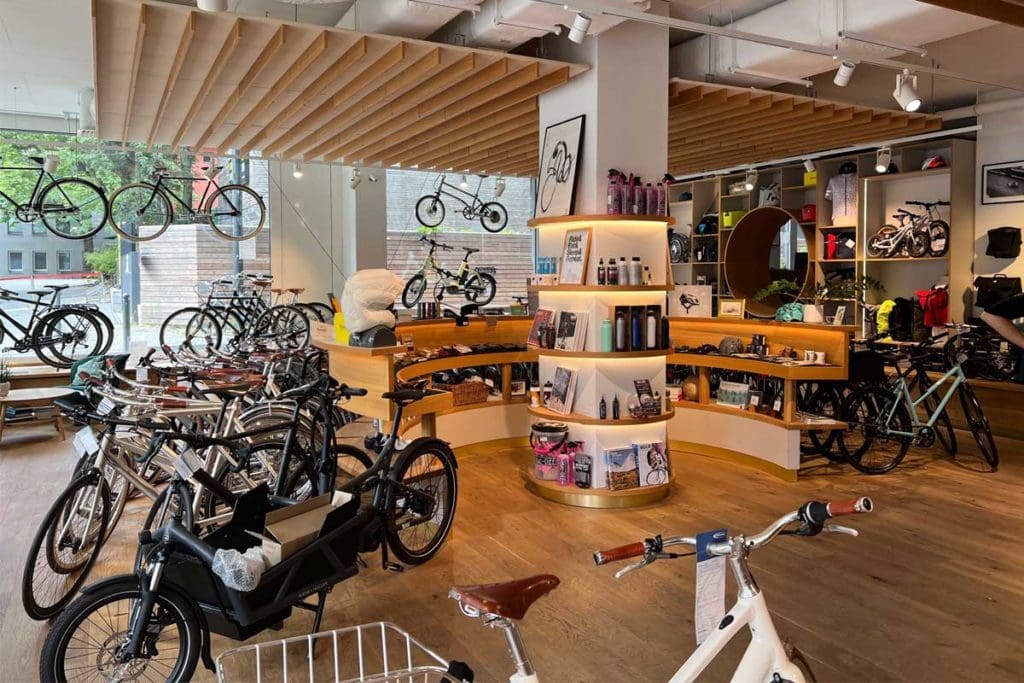
Bicicli Cycling Society
Just three kilometres away, in the upmarket area of Mitte, the Bicicli Cycling Society tells a vastly different story about the emergence of e-bikes.
Electric bike sales comprise around 60% of its business, actually well above the national and European averages, according to store manager Gunter Rothenberg.
Mitte’s demographic is dominated by older residents and young professions, amid a relative absence of more affordable flat accommodation, so Bicicli’s floor display is awash with premium brands including Berlin brand Schindelhauer, BMC, English company Pashley and Finland’s Pelago. There’s plenty of naked metal frames, and leather saddles and bar grips.
Folding bikes are claiming an increasing share the store’s commuter market. While a stunning €5,000 (A$7,300) lightweight Hummingbird folding bike is one of the centrepieces of the store, Rad der Stadt primarily sells Brompton.
“We received a delivery of around 20 Bromptons six months ago and we’re down to our last three,” he said.
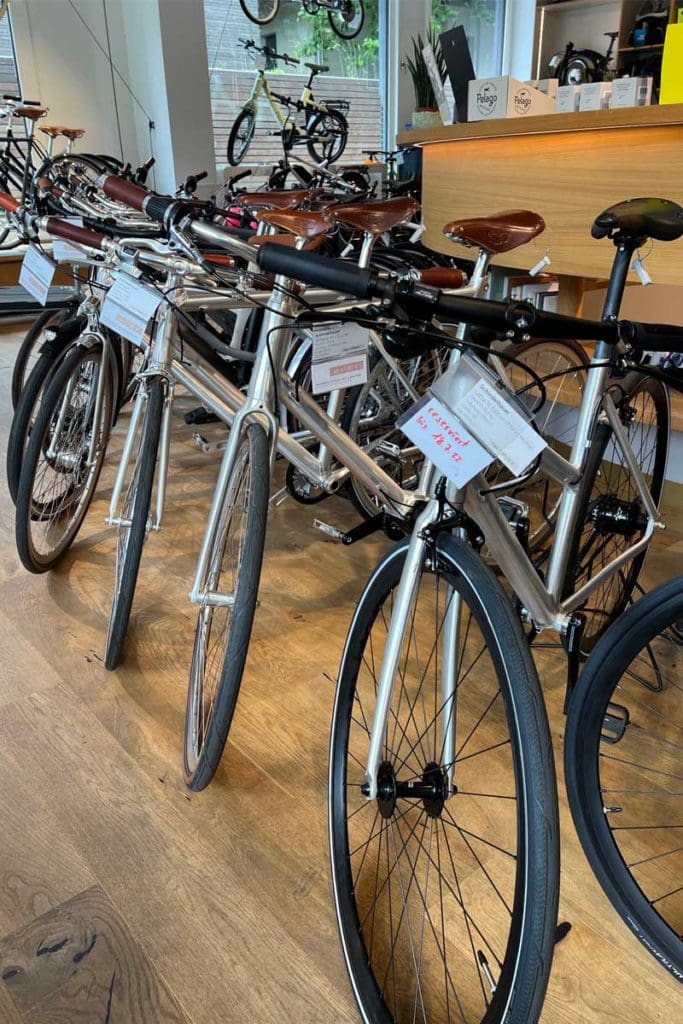
It’s probably to be expected that Bicicli would be at the forefront of bike commuting trends. Bicicli managing director Professor Stephan A. Jansen is also a professor for urban innovation at Berlin’s University of the Arts. Raised in a poor family, he worked in a bike shop to raise money to buy a Pinarello race bike with Campagnolo Super Record components, only to have it stolen after his first ride while he was DJing that night.
Stephan also heads consultancy firm Mond, which includes urban planners, architects, economists and traffic scientists to advise organisations on mobility solutions.
However, in the relative absence of young families in the immediate area, cargo bikes only comprise around 10% of Bicicli’s business, even though it stocks leading brands including Riese & Müller and Tern.
“It’s more like 50% for an e-bike store that is near here but in an area with a lot of families,” Gunter says.
Gunter says gravel bikes represent about 15% or their trade and growing, despite the store’s location in the most central part of the city.
“Gravel bikes are a ‘must have’ for more and more of our customers,” he said.
“They’re using them for their normal journeys in the city but you can do anything on a gravel bike.”
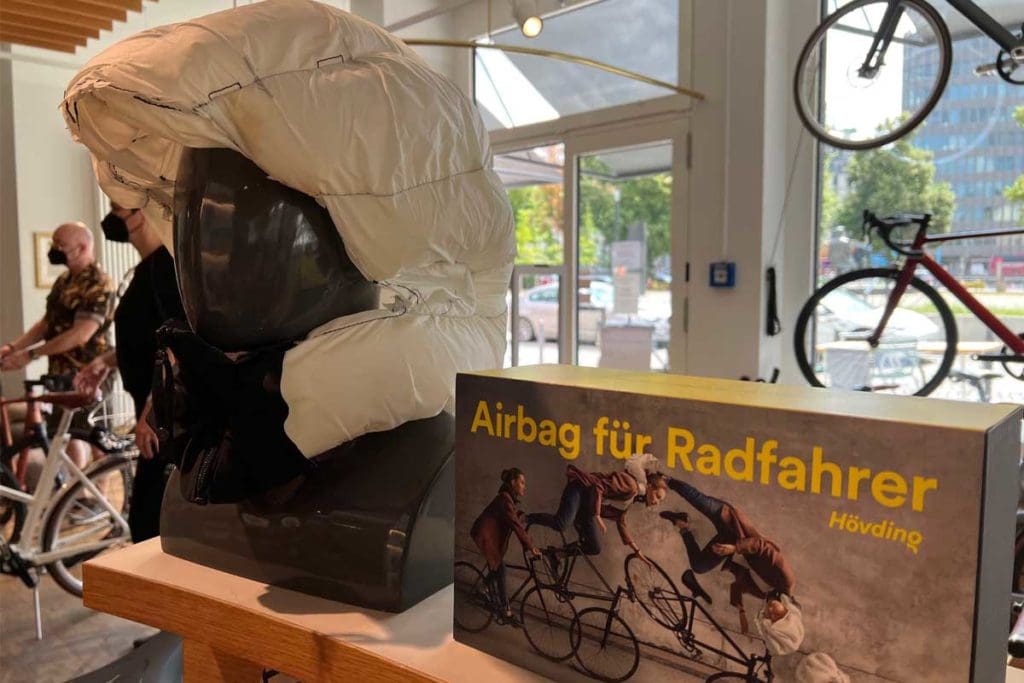
Polish brand Rondo and Germany’s Bombtrack are Bicicli’s biggest gravel sellers.
However, Gunter said supply continues to inhibit the store’s capacity to meet demand for gravel bikes and other categories.
“Our clients are often having to wait a long time for deliveries. About 16 months is normal but in some cases bikes we’re ordering in 2022 are not likely to come until 2024 or even 2025.
“We have long waits for all products – bikes and spare parts. It’s a big problem.
“We have a lot of bikes in our workshop waiting for repairs but they are still standing there while we wait for small parts to arrive.
“Many of the bikes and accessories we sell are still made in Asia – around 90% of frames.”
That experience goes a long way to explaining the significant number of Eurobike 2022 exhibitors moving towards onshore production in Europe.
